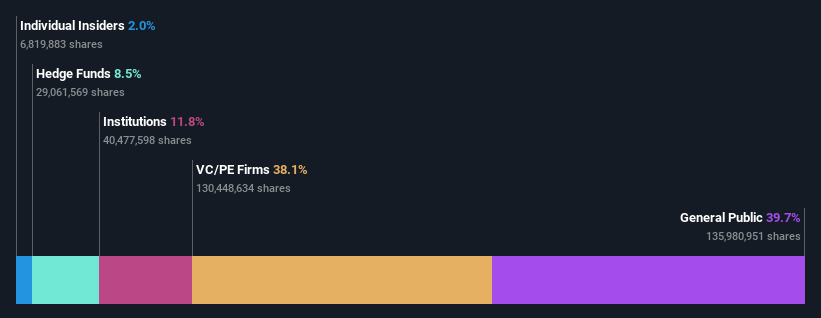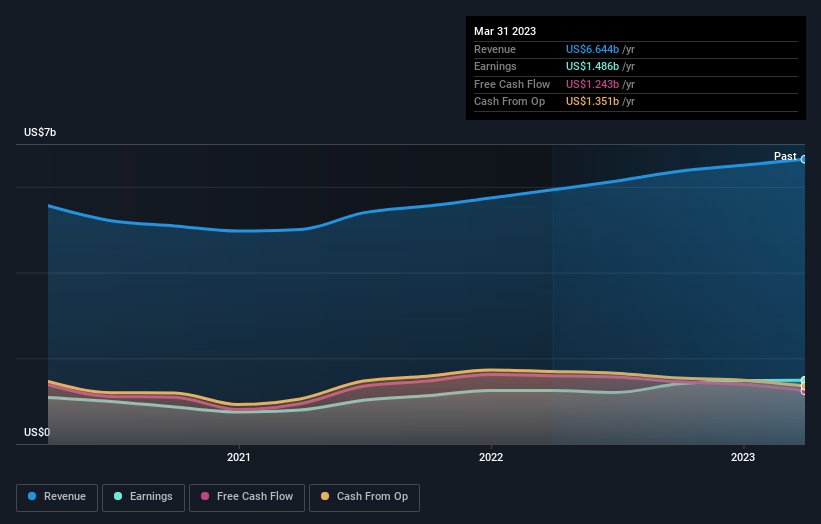Individual investors account for 40% of Restaurant Brands International Limited Partnership's (TSE:QSP.UN) ownership, while private equity firms account for 38%
Key Insights
The considerable ownership by individual investors in Restaurant Brands International Limited Partnership indicates that they collectively have a greater say in management and business strategy
58% of the business is held by the top 3 shareholders
Institutions own 12% of Restaurant Brands International Limited Partnership
A look at the shareholders of Restaurant Brands International Limited Partnership (TSE:QSP.UN) can tell us which group is most powerful. We can see that individual investors own the lion's share in the company with 40% ownership. Put another way, the group faces the maximum upside potential (or downside risk).
Meanwhile, private equity firms make up 38% of the company’s shareholders.
Let's delve deeper into each type of owner of Restaurant Brands International Limited Partnership, beginning with the chart below.
Check out our latest analysis for Restaurant Brands International Limited Partnership
What Does The Institutional Ownership Tell Us About Restaurant Brands International Limited Partnership?
Institutional investors commonly compare their own returns to the returns of a commonly followed index. So they generally do consider buying larger companies that are included in the relevant benchmark index.
As you can see, institutional investors have a fair amount of stake in Restaurant Brands International Limited Partnership. This can indicate that the company has a certain degree of credibility in the investment community. However, it is best to be wary of relying on the supposed validation that comes with institutional investors. They too, get it wrong sometimes. It is not uncommon to see a big share price drop if two large institutional investors try to sell out of a stock at the same time. So it is worth checking the past earnings trajectory of Restaurant Brands International Limited Partnership, (below). Of course, keep in mind that there are other factors to consider, too.
It looks like hedge funds own 8.5% of Restaurant Brands International Limited Partnership shares. That's interesting, because hedge funds can be quite active and activist. Many look for medium term catalysts that will drive the share price higher. Looking at our data, we can see that the largest shareholder is 3G Capital, Inc. with 38% of shares outstanding. With 12% and 8.5% of the shares outstanding respectively, Capital Research and Management Company and Pershing Square Capital Management, L.P. are the second and third largest shareholders.
After doing some more digging, we found that the top 3 shareholders collectively control more than half of the company's shares, implying that they have considerable power to influence the company's decisions.
While studying institutional ownership for a company can add value to your research, it is also a good practice to research analyst recommendations to get a deeper understand of a stock's expected performance. As far as we can tell there isn't analyst coverage of the company, so it is probably flying under the radar.
Insider Ownership Of Restaurant Brands International Limited Partnership
The definition of company insiders can be subjective and does vary between jurisdictions. Our data reflects individual insiders, capturing board members at the very least. The company management answer to the board and the latter should represent the interests of shareholders. Notably, sometimes top-level managers are on the board themselves.
Most consider insider ownership a positive because it can indicate the board is well aligned with other shareholders. However, on some occasions too much power is concentrated within this group.
Shareholders would probably be interested to learn that insiders own shares in Restaurant Brands International Limited Partnership. Insiders own CA$671m worth of shares (at current prices). It is good to see this level of investment. You can check here to see if those insiders have been buying recently.
General Public Ownership
With a 40% ownership, the general public, mostly comprising of individual investors, have some degree of sway over Restaurant Brands International Limited Partnership. While this size of ownership may not be enough to sway a policy decision in their favour, they can still make a collective impact on company policies.
Private Equity Ownership
With a stake of 38%, private equity firms could influence the Restaurant Brands International Limited Partnership board. Some investors might be encouraged by this, since private equity are sometimes able to encourage strategies that help the market see the value in the company. Alternatively, those holders might be exiting the investment after taking it public.
Next Steps:
I find it very interesting to look at who exactly owns a company. But to truly gain insight, we need to consider other information, too. For instance, we've identified 4 warning signs for Restaurant Brands International Limited Partnership (3 are significant) that you should be aware of.
Of course this may not be the best stock to buy. Therefore, you may wish to see our free collection of interesting prospects boasting favorable financials.
NB: Figures in this article are calculated using data from the last twelve months, which refer to the 12-month period ending on the last date of the month the financial statement is dated. This may not be consistent with full year annual report figures.
Have feedback on this article? Concerned about the content? Get in touch with us directly. Alternatively, email editorial-team (at) simplywallst.com.
This article by Simply Wall St is general in nature. We provide commentary based on historical data and analyst forecasts only using an unbiased methodology and our articles are not intended to be financial advice. It does not constitute a recommendation to buy or sell any stock, and does not take account of your objectives, or your financial situation. We aim to bring you long-term focused analysis driven by fundamental data. Note that our analysis may not factor in the latest price-sensitive company announcements or qualitative material. Simply Wall St has no position in any stocks mentioned.
Join A Paid User Research Session
You’ll receive a US$30 Amazon Gift card for 1 hour of your time while helping us build better investing tools for the individual investors like yourself. Sign up here

 Yahoo Finance
Yahoo Finance 

